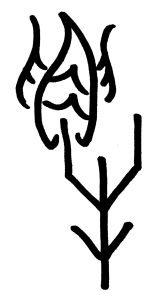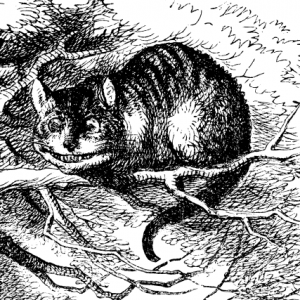 The ancient character for jie, the name of Hexagram 40, shows hands with a knife removing a cow’s horn. Perhaps this has to do with a horn implement for prising knots apart – Chinese boys could carry a knot-horn at their belt when they became men – or perhaps simply with the act of removing the horn, and with it the danger of being gored.
The ancient character for jie, the name of Hexagram 40, shows hands with a knife removing a cow’s horn. Perhaps this has to do with a horn implement for prising knots apart – Chinese boys could carry a knot-horn at their belt when they became men – or perhaps simply with the act of removing the horn, and with it the danger of being gored.
The primary meaning of jie is to untie, loosen, separate or cut apart; a secondary meaning is to interpret and understand – one imagines the kind of understanding that comes of breaking a ‘knotty’ problem down. The imagery of knots and their untying is key to Hexagram 40; it carries through the Wings as a kind of etymological-metaphorical echo.
Oddly enough, in the songs of the Shijing that are more or less contemporary with the Yi, jie is unfailingly a bad thing: it’s what good people and good rulers don’t do, and means being idle. English equivalents might be ‘unwinding’ or ‘slacking off’.
Limping and Release
Hexagram 40 is paired with and follows from 39, Limping or Difficulties:
‘Things cannot end with hardship, and so Release follows. Release means letting things take their time.’
(To ‘let things take their time’ is to let things go, to delay or slacken; the character shows trailing silk threads.)
Limping is a hexagram of uphill struggle, but it also suggests a turnaround, away from struggle and towards flow – like Yu the Great, the limping hero who conquered the floods not by toiling alone to dam the waters, but by enlisting allies to dredge channels to the sea. The emblem of this change is the distinction between northeast and southwest: ‘fruitful in the southwest, not fruitful in the northeast.’
The northeast was where the Zhou people ultimately found their calling and purpose, to oust the Shang dynasty, but the southwest was where they found allies. The two directions are first introduced in Hexagram 2, as where you gain or lose partners; Hexagram 39 shows how a move towards the southwest, away from solitary heroism and towards support, is the best response to struggle. Then Hexagram 40 arises from that turnaround, and begins by looking towards the southwest.
The same shift is reflected in the Sequence of Hexagrams, if you look back one more step to Hexagram 38, Opposing:
‘When the way of the home [hexagram 37] is exhausted, you naturally turn away, and so Opposing follows. Turning away naturally means hardship, and so Limping follows. Things cannot end with hardship, and so Release follows. Release means letting things take their time.’
A story takes shape: alienation creating hardship, which is ended by reconnection. This is connection not only with people – though that’s often vitally important, especially when you receive Hexagram 39 – but also with the whole environment, the whole natural flow of being.
The Cheshire Cat’s hexagram
‘Would you tell me, please, which way I ought to go from here?’
‘That depends a good deal on where you want to get to,’ said the Cat.
‘I don’t much care where -‘ said Alice.
‘Then it doesn’t matter which way you go,’ said the Cat.
‘- so long as I get SOMEWHERE,’ Alice added as an explanation.
‘Oh, you’re sure to do that,’ said the Cat, ‘if you only walk long enough.’
Lewis Carroll

‘Release. The southwest is fruitful.
With no place to go,
To turn round and come back is good fortune.
With a direction to go,
Daybreak, good fortune.’
Reconnecting in allied country, you can unwind – you’re not constantly under tension. You can take stock, reorient yourself and think about where you’re headed. Besides, to march out – against the Shang, for instance – on your own without support would be stupid. (And the Tuanzhuan, commentary on the oracle, says that going southwest means ‘gaining crowds’.) Reconnect first; then decide.
If you’re asking Yi’s help with a decision, this is one of its simplest (and most embarrassing) answers – a classic way for Yi to hand the responsibility and the question back to you. If this action doesn’t really lead anywhere, let it go; if it does, why haven’t you already started? You already know whether it does or it doesn’t; quit dithering.
Some subtleties – which shouldn’t distract from that embarrassingly simple ‘make your mind up’ answer…
The ‘turning round and coming back’ is lai fu, ‘coming returning’, with fu as in the name of Hexagram 24, Returning. So this is a reminder of Hexagram 24’s atmosphere of calm and sense of timeliness. The Tuanzhuan says that by returning you gain zhong, the centre.
‘Place’ as in ‘place to go’ is also used in 6.1, ‘not a lasting place for work’ – it’s similar to English ‘there’s no occasion to…’, only with the metaphor from place rather than time. A more idiomatic translation might be, ‘If this just isn’t going anywhere, turning and coming back is good fortune.’
‘Direction to go’, though, is Yi’s standard phrase for acting with purpose: literally going out with a sounding rod to test the depth of the river you’re crossing (LiSe), and specifically connected with travels away from the centre to the borders (Harmen). Rather than knowing exactly what’s ahead, it implies having a direction to explore.
Besides ‘quit dithering’, Hexagram 40’s message can also be, ‘Where are you really going with this?’ I have a couple of recent Hexagram 40 readings where what I was asking about was working well enough in the short term, but wasted effort in the long run. In one case I was asking about the condition of a wisdom tooth with a large cavity reaching through enamel and dentine almost to the pulp. Yes, I had successfully cured the infection for now (extraordinary stuff, garlic!); no, I did not have a ‘place to go’ with all my efforts, except, in the end, to the dentist to have the thing out. So Hexagram 40 can also say, ‘Beware activity for its own sake; untie the knots that bind one action to the next – I did this so now I must do this so next I must do this…’
Must you?
The key phrase there is ‘I must’ – or ‘I should’ or ‘I have to’ or ‘they left me no choice’, and so on – all those complicated knots.
The Daxiang (Image) says,
‘Thunder and rain do their work. Release.
A noble one pardons transgressions and forgives crimes.’
 This is the change in the atmosphere after a thunderstorm: oppression dispelled. The human way to create such a change is to forgive.
This is the change in the atmosphere after a thunderstorm: oppression dispelled. The human way to create such a change is to forgive.
The character for ‘crime’ is made up of ‘net’ and ‘wrong – the net catching the criminal, the precise opposite of Release. Release means amnesty: slackening and untying the net.
Sometimes we tie nets out of guilt and obligation for ourselves, sometimes for others – in which we invariably get tangled ourselves. (‘Justice must be done – and I must be its instrument!’) In any case, Hexagram 40 is a good cue to respond to every ‘must’ with a ‘really? who says?’ and unravel the net.
The Tuanzhuan, meanwhile, has two views on the trigrams:
‘When there is danger one should make a move, for by so moving one avoids danger, that is, Release occurs.’
– so the thunder trigram above is active in escaping from kan (water and deep pits) below. But also,
‘When Heaven and Earth allow Release, thunder and rain play their roles; when thunder and rain play their roles, all the various fruits, shrubs and trees burgeon forth.’
(Translation from RJ Lynn, I Ching.)
Release means not only escape from the trap, but also how liberated energy can come to fruition.
Structural perspectives
More angles on Hexagram 40 come from its structural connections:
Its complement – the hexagram different from it in every line – is 37, People in the Home. The complement shows both what the hexagram is not, and also what it fits with, like mould and cast, to make a whole. In the home, you have your place, and by filling this you fulfil yourself. You have your role, so in a sense what you ‘have to’ do is known. This offers you personal security: knowing what’s expected of you, knowing where you belong, having a safe place to grow with your needs provided for. Hexagram 40 is vertiginous by comparison: complete freedom that requires you to choose.
(There’s a little mirror-pattern in the Sequence here: hexagrams 38 and 39 are the only neighbouring non-paired complementary hexagrams. 37 and 40 are part of this play of contrasts: belonging and difference, isolation and alliance, struggle and freedom, freedom and belonging…)
Release’s Shadow – hexagram ‘minus 40’, inverting the whole sequence of hexagrams and counting backwards through them – is 25, Without Entanglement. So in a time of Release you should not think of it in terms of being Without Entanglement, and vice versa – Disentangling is no time to think of Release. That needs a second look, as on the face of it ‘disentangling’ and release from knots look very similar.
The distinction, I think, is that to be Without Entanglement you disengage. You are to act with ‘uprightness’ in the moment, well-grounded, freely present, but without assuming ownership of events, and especially not of results. 25 can say, ‘Not my business’; 40 must be always re-engaging. 25 might leave the outcome in the lap of the gods; 40 needs to be thinking about whether this is ‘going somewhere’. (Not always a good way to think, for instance if you need to be guided by enduring principle – 32.3 – or if your judgement of what works might be impaired – 64.6.)
And the heart of Release, its nuclear hexagram, is 63, Already Across: the moment when you’re already committed, already in motion, and need to keep your momentum to avoid falling into chaos:
‘Already across, creating small success.
Constancy bears fruit.
Beginnings, good fortune.
Endings, chaos.’
Always be beginning (63); always be choosing (40); never just follow along by rote.









Wait, what? You can get cavities in your wisdom teeth? That is a bit scary. If you were to get a cavity in one of these teeth, and it hadn’t yet broke the surface of the gums, I imagine that could cause a whole lot of issues. I don’t even know if you can get a cavity on teeth that haven’t popped up yet, but if you can, I don’t know how helpful brushing would be to it. I think at that point you would need to see a dental surgeon or something.
No, no – this was a fully erupted tooth, so a perfectly straightforward extraction.
i am also gettig this hexagrame in relationship to a question of what to do about my gum infection in 9 teeth that im praying insurance will cover this saturday